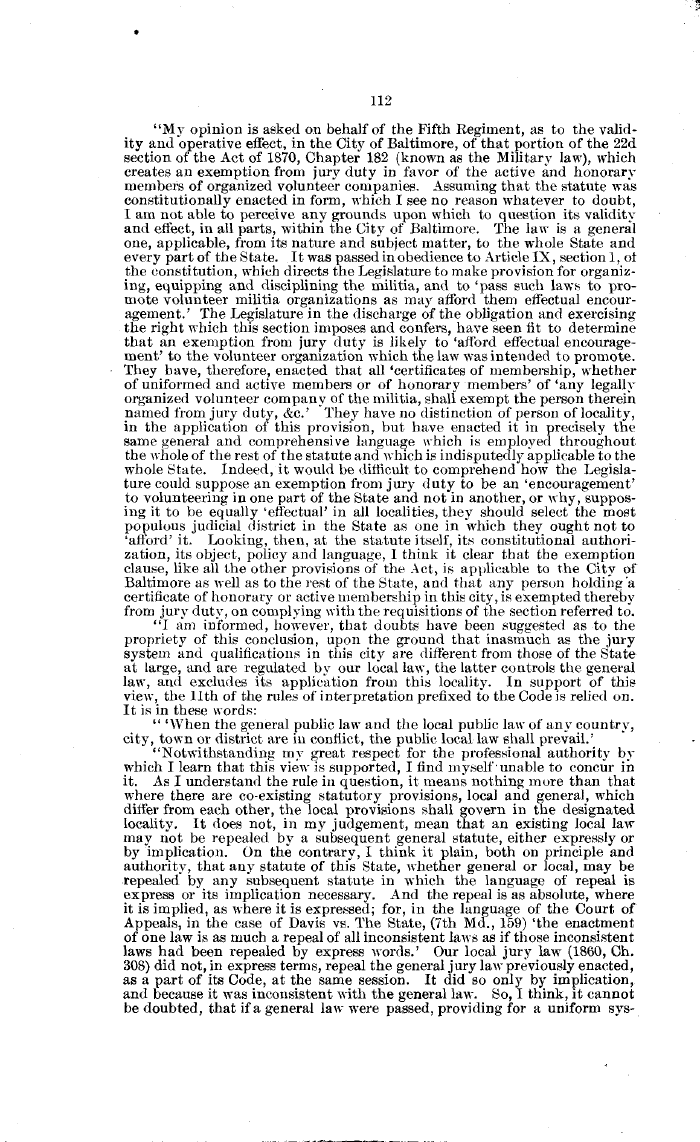 |
||||
 |
||||
| 112 "My opinion is asked on behalf of the Fifth Regiment, as to the validity and operative effect, in the City of Baltimore, of that portion of the 22d section of the Act of 1870, Chapter 182 (known as the Military law), which creates an exemption from jury duty in favor of the active and honorary members of organized volunteer companies. Assuming that the statute was constitutionally enacted in form, which I see no reason whatever to doubt, I am not able to perceive any grounds upon which to question its validity and effect, in all parts, within the City of Baltimore. The law is a general one, applicable, from its nature and subject matter, to the whole State and every part of the State. It was passed in obedience to Article IX, section 1, of the constitution, which directs the Legislature to make provision for organizing, equipping and disciplining the militia, and to 'pass such laws to promote volunteer militia organizations as may afford them effectual encouragement.' The Legislature in the discharge of the obligation and exercising the right which this section imposes and confers, have seen tit to determine that an exemption from jury duty is likely to 'afford effectual encouragement' to the volunteer organization which the law was intended to promote. They have, therefore, enacted that all 'certificates of membership, whether of uniformed and active members or of honorary members' of 'any legally organized volunteer company of the militia, shall exempt the person therein named from jury duty, &c.' They have no distinction of person of locality, in the application of this provision, but have enacted it in precisely the same general and comprehensive language which is employed throughout the whole of the rest of the statute and which is i udisputedly applicable to the whole State. Indeed, it would be difficult to comprehend how the Legislature could suppose an exemption from jury duty to be an 'encouragement' to volunteering in one part of the State and not in another, or why, supposing it to be equally 'effectual' in all localities, they should select the most populous judicial district in the State as one in which they ought not to 'afford' it. Looking, then, at the statute itself, its constitutional authorization, its object, policy and language, I think it clear that the exemption clause, like all the other provisions of the Act, is applicable to the City of Baltimore as well as to the rest of the State, and that any person holding 'a certificate of honorary or active membership in this city, is exempted thereby from jury duty, on complying with the requisitions of the section referred to. "I am informed, however, that doubts have been suggested as to the propriety of this conclusion, upon the ground that inasmuch as the jury system and qualifications in this city are different from those of the State at large, and are regulated by our local law, the latter controls the general law, and excludes its application from this locality. In support of this view, the llth of the rules of interpretation prefixed to the Code is relied on. It is in these words: " 'When the general public law and the local public law of any country, city, town or district are in conflict, the public local law shall prevail.' "Notwithstanding my great respect for the professional authority by which I learn that this view is supported, I find myself'unable to concur in it. As I understand the rule in question, it means nothing more than that where there are co-existing statutory provisions, local and general, which differ from each other, the local provisions shall govern in the designated locality. It does not, in my judgement, mean that an existing local law may not be repealed by a subsequent general statute, either expressly or by implication. On the contrary, I think it plain, both on principle and authority, that any statute of this State, whether general or local, may be repealed by any subsequent statute in which the language of repeal is express or its implication necessary. And the repeal is as absolute, where it is implied, as where it is expressed; for, in the language of the Court of Appeals, in the case of Davis vs. The State, (7th Md., 159) 'the enactment of one law is as much a repeal of all inconsistent laws as if those inconsistent laws had been repealed by express words.' Our local jury law (1860, Ch. 308) did not, in express terms, repeal the general jury law previously enacted, as a part of its Code, at the same session. It did so only by implication, and because it was inconsistent with the general law. So, I think, it cannot be doubted, that if a general law were passed, providing for a uniform sys- |